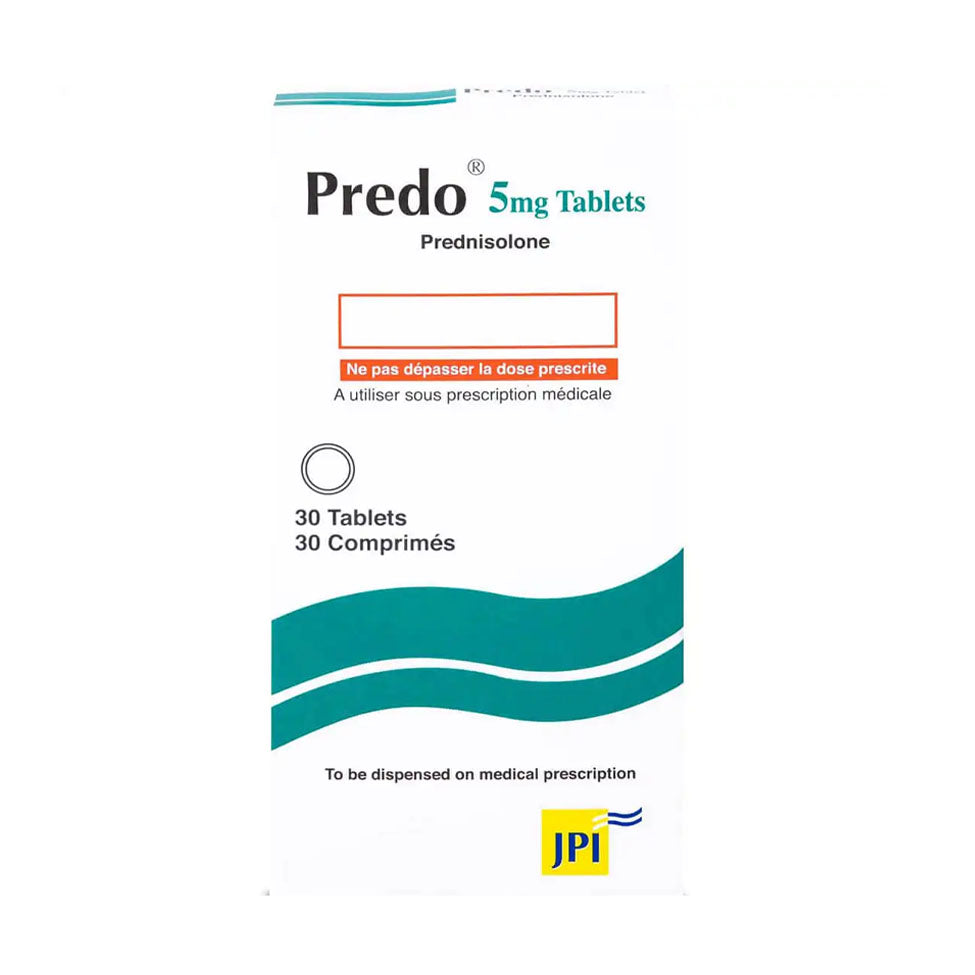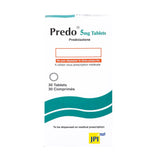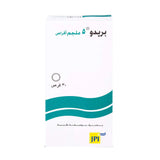Prideo 5 mg 30 tablets:
Prednisolone is a corticosteroid hormone made by the adrenal gland and is intended to treat endocrine disorders, rheumatism, and blood diseases. Collagen, dermatology, ophthalmology, respiratory and gastrointestinal diseases. Allergic and edema conditions. And other conditions such as meningitis.
Do not take prednisolone if:
- You are allergic to prednisolone or to any of the other ingredients of this medication.
-
You have any infection, unless you are receiving specific treatment for it.
- Suffering from eye herpes infection.
- You suffer from lactose intolerance or glucose-galactose malabsorption.
How to use Predo:
- Always take this medicine exactly as your doctor or pharmacist tells you.
- Consult your doctor or pharmacist if you are not sure.
- If you take more medicine than you should, talk to your doctor or go to hospital straight away.
- If you forget to take a dose, take it as soon as you remember unless it is almost time for your next dose
- Do not take a double dose (two doses at the same time) to make up for a missed dose.
Warnings and precautions:
Talk to your doctor, pharmacist or nurse before taking prednisolone if:
- You have suffered from severe depression or manic depression (bipolar disorder) in the past. This includes having previously been depressed while taking steroid medications such as prednisolone.
- Any of your close family members have had these diseases.
- You have osteoporosis (weak bones), especially in postmenopausal women.
- You have high blood pressure or heart failure.
- You have diabetes or a history of diabetes in your family.
- You have tuberculosis (a disease that affects the lungs) or a history of tuberculosis.
- You have glaucoma (an eye condition that affects vision), a history of glaucoma, or a history of glaucoma in your family.
- You have a history of muscle weakness caused by steroid treatment.
- You have severe liver or kidney problems.
- You have epilepsy, seizures/seizures.
- You have a stomach ulcer.
- You have hypothyroidism, which can cause fatigue and weight gain.
- You have had a recent heart attack.
- You have ever had blood clots.
- You have Cushing's disease.
- You have inflammatory bowel disease such as Crohn's disease.
- You have scleroderma (also known as systemic sclerosis, an autoimmune disorder).
side effects:
- Nausea, heartburn, headache, dizziness, menstrual changes, difficulty sleeping, increased sweating, acne, excess hair growth, or slow wound healing may occur. If any of these effects persist or worsen, notify your doctor or pharmacist promptly.
- Because this medication works by weakening the immune system, it may decrease your ability to fight infections. This may make you more likely to get a serious (rarely fatal) infection or make your infection worse. Tell your doctor right away if you have any signs of infection (such as cough, sore throat, fever, chills).
- Use of this medication for prolonged or repeated periods may cause oral thrush or yeast infection. Contact your doctor if you notice white spots in your mouth or a change in vaginal discharge.
Other medicines and prednisolone:
Tell your doctor if you are taking any of the following medications:
- Antiepileptic medicines used to treat seizures/seizures or epilepsy.
- Antivirals such as ritonavir that can be used to treat HIV infection.
- Antibiotics such as erythromycin, rifampicin, and rifabutin.
- Thalidomine and aminoglutethimide, which are used to treat some types of cancer.
- Coumarin anticoagulants such as warfarin, which are used to thin the blood.
- Aspirin and other nonsteroidal anti-inflammatory drugs (NSAIDs).
- Somatropin or growth hormones.
- Isoniazid, which is used to treat tuberculosis.
- Antifungals such as ketoconazole and amphotericin, which are used to treat fungal infections.
- Cyclosporine, which is used to treat rheumatic diseases, skin complaints, infections, or after a transplant.
- Live vaccines.
- Medicines used to relax muscles during surgery.
- Cardiac glycosides, eg digoxin.
- Salbutamol, formoterol, fenoteral, ritodrine, bambuterol, salmeterol and terbutaline.
- Insulin and other medications used to treat diabetes.
- Medicines used to treat high blood pressure.
- Theophylline, which is used to treat asthma and chronic obstructive pulmonary disease.
- Loop diuretics eg furosemide.
the components:




